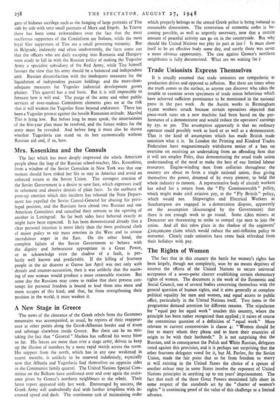The Rights of Women The fact that in this country
the battle for women's rights has been largely, though not completely, won by no means deprives of interest the efforts of the United Nations to secure universal acceptance of a seven-point charter establishing certain elementary rights of women. The document is the work of the Economic and Social Council, one of several bodies concerning themselves with the general question of human rights, and it aims generally at complete political equality for men and women, and equal access to public office, particularly in the United Nations itself. Two items in the programme demand attention for different reasons. The stipulation for " equal pay for equal work " touches this country, where the principle has been rather recognised than applied ; it raises of course the contentious question of a definition of " equal work." More relevant to current controversies is clause 4: " Women should be free to marry whom they please and to leave their countries of origin to be with their husbands." It is not surprising that the Russian, and in consequence the Polish and White Russian, delegates voted against this provision, and it is perhaps not surprising that the other fourteen delegates voted for it, but M. Pavlov, for the Soviet Union, made the fair point that so far from freedom to marry at will existing in the United States the choice of a spouse of another colour may in some States involve the exponent of United Nations principles in anything up to ten years' imprisonment. The fact that each of the three Great Powers mentioned falls short in some respect of the standards set by the " charter of women's rights " is convincing proof of the value of this challenge to a limited advance.


































 Previous page
Previous page